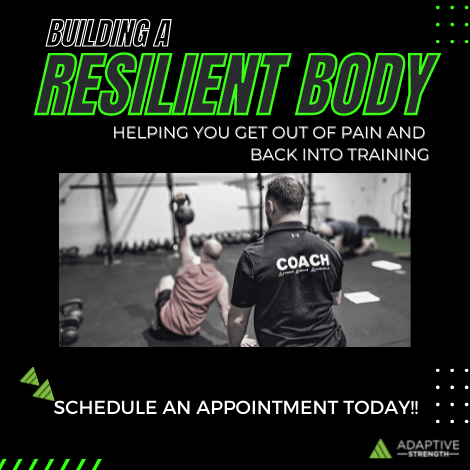If you’ve ever wondered how many calories you really need to maintain your weight, or why your workout doesn’t always leave you dripping in sweat, you’re not alone.
If you’ve ever found yourself asking:
“How many calories should I eat?”
“Why am I not losing fat even though I’m exercising?”
“Do I need to do cardio every day to see results?”
…then this article is for you.
At Adaptive Strength, our team of personal trainers, physiotherapists, and strength coaches in Booragoon work with real people who want to lose fat, feel stronger, and build sustainable habits. Whether you’re just starting out or returning after time off, we cut through the confusion and help you focus on what works.
And it all starts with understanding how your body burns calories and how fat loss actually happens.
What Is BMR and Why Should You Care?
Your Basal Metabolic Rate (BMR) is the number of calories your body needs to keep you alive while at rest. Think breathing, circulating blood, repairing cells, and so on.
It’s the bare minimum your body needs—before we even add in movement, exercise, or digestion.
That means if you stayed in bed all day, doing nothing, your body would still burn calories to:
- Keep your heart beating
- Maintain your breathing
- Regulate temperature
- Support basic cellular repair and brain function
BMR is determined mostly by:
- Age
- Weight
- Height
- Gender
- Muscle mass
For example, a 26-year-old woman who is 80kg and 5’4” tall has a BMR of about 1,500 to 1,600 calories per day.
This is your minimum energy requirement — before we even add in walking, working, training, or digesting food.
The more lean muscle you have, the higher your BMR. That’s one reason why strength training is so valuable — it doesn’t just make you stronger; it helps your body burn more calories 24/7.
Maintenance Calories: What You Actually Burn in a Day
Your maintenance calories — officially known as Total Daily Energy Expenditure (TDEE) — include:
- BMR
- Physical activity
- Exercise
- Digestion (yes, eating burns calories too!)
For our example client with minimal physical activity, her maintenance calories might be around 1,800 to 1,900 per day.
This is the amount of energy she would need to eat to stay the same weight — not gain or lose fat.
If she became more active (e.g., walking daily or doing 3 gym sessions per week), her maintenance calories could increase to 2,000–2,200 or more.
The Basics of Fat Loss: Creating a Calorie Deficit
Let’s make this very clear:
Fat loss happens when you burn more energy than you consume.
One kilogram of body fat stores about 7,700 calories. So to lose half a kilogram per week, you need to create a deficit of about 3,500 calories across that week — or 500 calories per day.
There are three ways to create this deficit:
- Eat less (consume fewer calories than maintenance)
- Move more (increase daily activity and/or structured exercise)
- Do both (the most effective and sustainable option)
Here’s a practical example:
If your maintenance is 1,800 calories:
- You could eat 1,300 calories per day (500 calorie deficit)
- Or eat 1,600 and burn 200 through exercise
- Or eat 1,500 and exercise a bit longer or harder
The best approach? One that fits your lifestyle and keeps you consistent.
Exercise and Calories: It’s Not All About the Burn
It’s common to think that only cardio burns fat, because it feels harder. You’re out of breath, sweaty, and tired. But don’t underestimate the value of weight training.
Here’s why:
- Cardio burns more calories during the workout
- Weight training builds lean muscle, which helps your body burn more calories even at rest
So even if your weight training session doesn’t feel like a HIIT workout, you’re still doing valuable metabolic work.
What If My Heart Rate Doesn’t Get That High?
This is a common concern we hear at Adaptive Strength from clients doing resistance or circuit training:
“I’m not puffing or sweating as much—am I burning enough calories?”
Here’s the answer: Yes, you’re still making progress.
You’re building strength, improving joint stability, and increasing lean muscle. That lean muscle increases your resting metabolic rate, which means you burn more calories 24/7 — not just during a workout.
Circuit-style resistance training, where you move between exercises with minimal rest, often blends strength and light cardio anyway. It’s incredibly effective and very sustainable long-term.
Weight Training vs. Cardio: What’s More Effective for Fat Loss?
Let’s compare:
Cardio (walking, running, cycling, swimming)
✅ Burns more calories during the session
✅ Great for heart health and endurance
❌ Minimal impact on muscle mass
❌ Can lead to muscle loss if overdone without strength training
Resistance Training (weights, kettlebells, bodyweight)
✅ Builds lean muscle (increases BMR)
✅ Improves joint health, posture, and mobility
✅ Supports long-term fat loss
❌ Burns fewer calories in the moment than cardio
✅ Keeps your metabolism higher even at rest
Conclusion? You don’t have to pick one. At Adaptive Strength, our Booragoon-based programs combine the best of both: strength, conditioning, and movement patterns that deliver results.
“I Don’t Feel Like I’m Working Hard Enough” — Does That Matter?
Many clients worry when they don’t feel exhausted or dripping with sweat after a workout.
“My heart rate didn’t get that high… am I burning fat?”
Here’s what you need to know:
- Sweat is not a measure of calorie burn
- Heart rate can vary based on fitness level and workout type
- You can still be making progress even if it doesn’t feel brutal
If you’re doing circuit-style resistance training, with minimal rest between sets, you’re still elevating your heart rate enough to improve fitness — while stimulating muscle growth and metabolic benefits.
Don’t chase fatigue. Chase consistency, strength, and smart progression.
Sustainable Fat Loss: What Actually Works Long-Term
Here’s what we’ve seen work time and again with clients at Adaptive Strength:
🔹 Understand your maintenance calories
🔹 Create a modest, sustainable calorie deficit
🔹 Combine strength training and movement (e.g., walking, cardio, everyday activity)
🔹 Prioritize protein intake to preserve lean muscle
🔹 Sleep well, manage stress, and stay consistent
Forget 1,200-calorie crash diets or endless cardio. Fat loss should fit your life, not consume it.
At Adaptive Strength, We Make This Simple
Our team in Booragoon works with people who want more than just a “cookie-cutter” plan.
Whether your goal is to:
- Lose weight without extreme dieting
- Learn to train with proper technique
- Improve energy and strength
- Build a routine that works around work, kids, or injury history
…we’ll guide you every step of the way.
Our programs include:
- 1-on-1 assessment and planning
- Personalized nutrition guidance
- Supervised small group training sessions
- Support and accountability from your own Personal Progress Coach
FAQ: Calories, Fat Loss, and Training
Q: How many calories do I need each day?
A: It depends on your age, weight, height, muscle mass, and activity. Most women maintain weight around 1,700–2,200 kcal/day. We help you find your exact number in your assessment.
Q: What’s a healthy rate of fat loss?
A: 0.25–0.5kg per week is realistic and sustainable. Faster fat loss often leads to rebound weight gain.
Q: Do I have to do cardio to lose fat?
A: No — fat loss is about calorie balance. Strength training and light movement (like walking) can be just as effective.
Q: Why isn’t the scale moving even though I feel better?
A: You might be gaining muscle while losing fat. That’s a good thing! We track progress through strength gains, energy, measurements, and how your clothes fit — not just weight.
Q: Can I just eat better without exercising?
A: Yes, but it’s less effective long term. Exercise helps preserve muscle, improve health markers, and makes fat loss easier to maintain.
Ready to Stop Guessing and Start Progressing?
If you’re ready to lose fat the smart way, without starving, stressing, or burning out, we’d love to help.
At Adaptive Strength in Booragoon, we specialize in:
- Helping beginners and returners feel confident in the gym
- Fat loss programs built around your body and lifestyle
- Expert coaching that simplifies the process
✅ Book a free consultation
✅ Find your maintenance calories
✅ Start training with a plan built just for you
👉 Visit Adaptive Strength or call us today.
We’ll help you take the guesswork out of fat loss — and get results that last.




